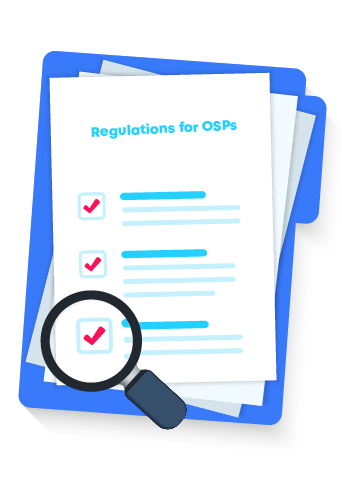BPOs and IT/ITeS Companies: Consultation on DOT regulations
We, at VINCULAR, provide consultation and project management on Department of Telecommunication (DOT) regulations for call center operators/BPOs/OSPs, including Mock audit of Telecom infrastructure, assessment of call data records (CDRs) and much more.
Regulating Authority-Background
India is currently the world’s second-largest telecommunications market with a subscriber base of 1.20 billion and has registered a strong growth in the past decade and a half in this sector. Being the second highest revenue earner for the government, this sector is expected to contribute as much as 90% of the government’s non-tax revenue. The Digital India program is also almost completely dependent on the telecom sector.
The Telegraph Act is the primary legislation underlying the telecommunications regulatory framework for India and prescribes various powers of the government to operate and regulate telecom services in the country.
Under the current regime, the task of granting licenses and approvals to telecom players for providing telecom services in India has been assigned to the Department of Telecommunications (DoT) which comes under the Ministry of Communications. The DOT formulates and implements the telecom licensing regime, under which licenses and approvals are granted to corporations to carry out telecom services.
Under the current regime, the task of granting licenses and approvals to telecom players for providing telecom services in India has been assigned to the Department of Telecommunications (DoT) which comes under the Ministry of Communications. The DOT formulates and implements the telecom licensing regime, under which licenses and approvals are granted to corporations to carry out telecom services.

Other Service Providers in India

As per the present guidelines from DOT, an Indian company, registered under the Indian Companies Act, 2013 or an LLP (Limited Liability Partnership) registered under LLP Act, 2008 or a partnership firm or an organization registered under Shops and Establishment Act providing Voice-Based Business Process Outsourcing (BPO) services to their customers located worldwide including India are defined as Other Service Providers (OSP).
Before the covid-19 pandemic, there was a requirement of registration, where OSPs had to take registration from DoT for running g BPO /contact center services in India. However, with the latest revised OSP guidelines dated 23rd June 2021, the government has removed the requirement of registration as well as several compliances associated with the registration such as Bank Guarantee, annual return filing, etc. to promote ease of doing business in India.
Before the covid-19 pandemic, there was a requirement of registration, where OSPs had to take registration from DoT for running g BPO /contact center services in India. However, with the latest revised OSP guidelines dated 23rd June 2021, the government has removed the requirement of registration as well as several compliances associated with the registration such as Bank Guarantee, annual return filing, etc. to promote ease of doing business in India.
Regulations for OSPs
As per the latest guidelines from DOT “Revised guidelines for Other Service Providers (OSPs)” , any entity engaged in Voice-based BPO services will be considered as an OSP. To run OSP/call centers in India, there are certain mandatory compliance requirements that need to be followed by OSPs, such as all the voice traffic needs to be carried over the service provider managed MPLS VPN/IPLC/NPLC circuits only and CDRs and system logs should be managed for a period of 1 year and much more. Furthermore, OSPs agents can do Work from Home operations or from Anywhere within India maintaining all the security guidelines provided by the authority in this regard.
The updated regulations reduced the number of compliances and granted special exemptions to OSPs and contact center operators in India, but they also mandated that OSPs must continue to fully comply with all security requirements in a self-regulatory way.

How can we help

The Authority’s relaxation cannot be interpreted as such that OSPs are not subject to any restrictions while conducting business in India. Rather, OSP businesses are required to self-regulate their operations and adhere to all security regulations outlined in the Revised OSP guidelines.
A team of experts from VINCULAR are assisting companies in India that are involved in the BPO/outsourcing industry and advising them on how to manage all OSP operations in accordance with the rules. In addition to mock audits and assessments of business operations under OSP, we offer consultations and project management services to businesses regarding the deployment of any cloud solution for BPO/call center operations. We also offer assistance with the necessity of storing call data records (CDRs) and system logs, among many other things.
A team of experts from VINCULAR are assisting companies in India that are involved in the BPO/outsourcing industry and advising them on how to manage all OSP operations in accordance with the rules. In addition to mock audits and assessments of business operations under OSP, we offer consultations and project management services to businesses regarding the deployment of any cloud solution for BPO/call center operations. We also offer assistance with the necessity of storing call data records (CDRs) and system logs, among many other things.
Our service
Consultation on Department of Telecommunications guidelines for OSPs
Project management and maintenance of all the compliances associated with Voice operations
Mock audit and compliance assessment of any cloud-based solution for OSP/BPO operations
FAQs
OSPs refer to Other Service Provider. OSPs are companies/entities in India providing voice based ‘Business Process Outsourcing’ services to their customers in India or worldwide.
BPO refers to Business Process Outsourcing. BPO services are considered as call center services provided by OSPs wherein customers can access the network of OSPs via PSTN/ PLMN/ ISDN.
The requirement of having a registration certificate with DoT for running an OSP center is done away with.
LSA refers to Licensed Service Areas. The country has been divided into 22 LSAs for telecommunication services.
Companies will have to retrieve the BGs from the respective LSA offices of DoT. Respective LSAs have already initiated this process.
No. The earlier guidelines included a number of activities within the ambit of OSP, but the latest guidelines limit covers only the ‘Voice Based activities’.
No, there are no periodic filings required to be made. However, voice based OSPs are required to maintain CDRs, access logs, configuration of EPABX routing tables, etc., for a period of 12 months. No other document/ annual return is required to be submitted to DoT.
As a special dispensation allotted by DoT, OSPs are allowed to carry aggregated switched voice (incoming or outgoing) traffic between their foreign PoP and OSP centers in India over WAN (Wide Area Network) technology / managed circuits. For international operations, OSPs are allowed to have PSTN breakout outside India for inbound/outbound calls.
As a special dispensation to OSPs, DoT has allowed OSPs to have centralised media gateway for incoming PSTN NLD (National Long Distance). OSPs are allowed to collect, carry, convert, and exchange incoming PSTN traffic from a centralised location to other OSP sites in India over WAN technology / managed circuits. For outbound voice traffic, OSPs should deploy individual PSTN gateway at each site.
DoT has stated that the infringement in jurisdiction of DoT licensed TSP (Telecom Service Provider) or intermixing of IP-PSTN traffic will be considered as Toll bypass.
Yes, it is allowed. Internet connectivity can be accessed from a centralised location in India over WAN technology/ company’s managed circuits.
Yes, interconnectivity of OSP centres for different companies is allowed, however, the below needs to be taken care of:
1- Interconnectivity should be in an isolated manner for exchange of OSP traffic.
2- Interconnectivity must be in a responsible manner with no violations made.
3- Logs of all the activities will have to be maintained in this case for any security requirement in future.
1- Interconnectivity should be in an isolated manner for exchange of OSP traffic.
2- Interconnectivity must be in a responsible manner with no violations made.
3- Logs of all the activities will have to be maintained in this case for any security requirement in future.
Yes, OSPs are allowed to share infrastructure (Call Manager, PRI lines, etc.) between enterprise telephony and OSP operations, as long as the logical partitioning configurations are maintained in the call manager and there is no intermixing of PSTN and IP traffic.
Foreign based EPABX for OSPs are allowed as a special dispensation. The OSP must comply with data privacy laws and security conditions laid out by DoT.
As per the new norms, DOT has given following relaxations in terms of WFH/A (Work from Home/ Anywhere):
1- The remote agent can work from any location in India.
2- There is no need for any specific type of connectivity circuit for interconnecting remote agent to OSP center. Any technology can be used for doing so, including broadband over wireless/ wireline.
3- The remote agent can connect to the EPABX of the OSP, be it dedicated EPABX or centralized EPABX of the organization.
4- The remote agent can connect directly with the client’s EPABX.
1- The remote agent can work from any location in India.
2- There is no need for any specific type of connectivity circuit for interconnecting remote agent to OSP center. Any technology can be used for doing so, including broadband over wireless/ wireline.
3- The remote agent can connect to the EPABX of the OSP, be it dedicated EPABX or centralized EPABX of the organization.
4- The remote agent can connect directly with the client’s EPABX.
The system logs and tamper proof CDRs/ UDRs must be stored for one year at one of the OSP sites in India and the time stamp should be synchronized with IST. The CDRs/ UDRs and system logs should contain necessary information for traceability/ tracking/ forensic purposes of LEAs (Law Enforcing Agencies)/ authority.

